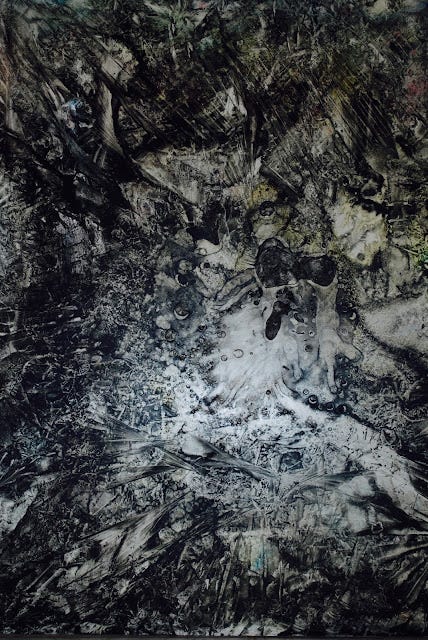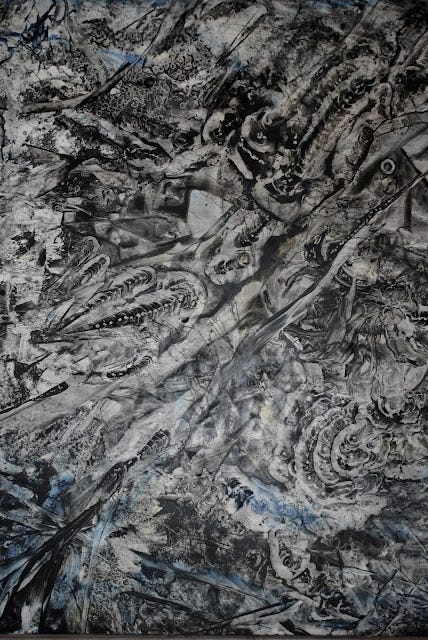The act of painting is one of revelation. It does not happen all at once, like a miracle, though that is its effect. If successful it affects the viewer so completely that they are transformed from the inside out. Aesthetic recognition connects a manifestation of the texture and matter of reality to a reasoned understanding of what the world is about, who we are within it, and how a force such as art can alter both, while remaining resolutely unique. It takes time to adjust to the aesthetic at work in an advanced artist’s oeuvre. Artists often connect to an aesthetic that may be removed from the contemporary scene, yet they choose their approach because it represents the dynamic most central to their world view. From a time before the invention of history, when mankind was in its infancy, with limited comprehension of the universe, there was still an inkling that possibilities existed beyond their reach. The night sky revealed tiny sparks of light, campfires suspended in a sea of blackness, like their own campfire defining the safety of home.
To peer into Richard Rivera’s paintings is like having an intimate view into the mysteries of creation. Daily life does not appear here, nor do politics, art trends, or social attitudes. We are faced with matter itself on a quantum scale. Rivera is an artist for whom the mysteries of existence take the shape of scientifically specific elements common to the universe. Why imagine the essential abstraction originating out of the mind when it surrounds the Earth in all directions infinitely, in a multiplicity of forms and energies, and is open to individual interpretation as well as having been objectively studied by a range of scientists. Rivera is fascinated with darkness and what can be found there. We are talking specifically here of what Gene Roddenberry called “The Final Frontier,” of the space all around Planet Earth, stretching to infinity in all directions, and not merely the unknown recesses of man’s imagination—though like either scientifically defined or fantastically inspired versions, his own work takes both imagination and time to confront. The active depiction of visual obscurity might seem in opposition the quality of revelation, yet if we consider that knowledge is to be deciphered or sourced rather than merely read; if we understand that comprehension is as imperfect as the senses; and if we can feel our way around an art work and not merely reduce it to ideas or commonsensical platitudes, then it can open up to us and expand both the world and our way of looking at it. This is what Richard Rivera intends in his fascinating, dynamic, and obscure works.
We find that each of Rivera’s paintings are, in their own way, a different kind of animal. Some resemble organic or subatomic forms photographed through a microscope, or viewed through a periscope deep beneath the surface of the ocean, where native flora and fauna exist in the absence of sunlight. They contain some recognizable forms such as silhouettes of animals, faces peering with a sidelong glance out from behind the frisson of his brushwork, and objects such as a man fishing in a boat, a train car, and many others that mutably merge with the background, floating back and forth between clarity and obscurity, eyes and fingers slipping into view now and then. There is little attempt to make anthropological forms, though it’s nearly impossible for the aesthetic attention of the viewer to engage with a morass of detail without instinctually organizing it into forms that serve a metaphorical, and subsequently narrative logic. If we can place a thing, however fragmentary and forlorn, into the void, then we can imagine its story.
Consider ‘The Dreamer at Rest’—looking at the picture we see a literal briar patch of active forms, all issuing from a void in the center. The dream itself is indiscernible, full of shifting forms and colors, yet we can imagine that the dreamer at rest is a person fulfilling their conscious life. Dreaming is sometimes a pleasure and sometimes a burden but it is an activity by which we are subconsciously connected to a world in which nature extends beyond reason. The dreamer “at rest” is a person not dreaming, yet the dream—the palimpsest of meaning in metaphysical manifestation—remains constantly active, creating new dreams, giving birth to life that we can only see and communicate with when our eyes are closed.
A similar dynamic is at work is ‘A Quantum Creation Connection’ though in this case we are regarding less the unconscious and more the actual matter of cosmic events. Rivera regards the universe as not merely an immense void but as an incubator in which “dark matter” is literally alive. Just because mankind feels it has evolved to a position by which it can perceive and judge all the levels within and beyond itself, it may yet be willfully ignorant of levels of creation that are taking place now on an infinite scale not only beyond the horizon but at subatomic levels within our own atoms. Evolution is a process with its own intentions in mind.
A final example among the many present in Rivera’s work is one in which the metaphor seems to ground it decisively. “The Emergence of Life” presents us with a monochromatic scene that resembles a grainy black and white photograph of an archeological dig in which Pterodactyl skeletons are sheathed in layers within fossilized rock, their long beaks filled with teeth and their eye sockets staring blankly past the extinction level event that forever froze them in the evolutionary chain. The discovery of these remains was one of the flashpoint moments in our reckoning with the erasure of times past. Not only did it make clear a lot about prehistory that was not known, but it gave us a sense of how completely the event that ended all life was proof that we are still living on the edge of darkness. The Earth floats within a seething cauldron of potentially devastating energies, a space for potential change that could alter the sum total of mankind’s fate at any moment. The universe is immense, beyond complete reckoning. But Richard Rivera gives us clues for how to peer into it, how to live in the dark with courage and joy.






